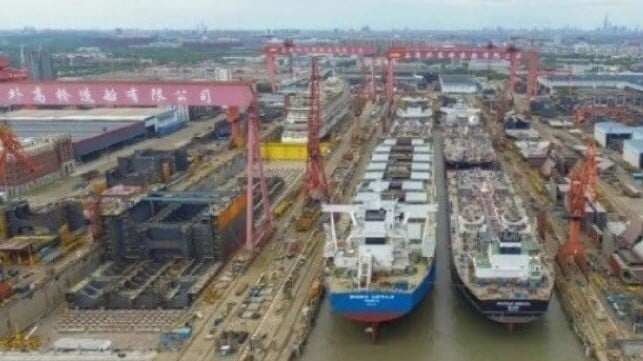Beijingwalker
Elite Member
- Nov 4, 2011
- 76,577
- 104,150
- Country of Origin

- Country of Residence

Chinese Shipyards Continue to Build Lead Taking Nearly All Orders in August

Chinese yards booked nearly all the newbuilder orders in August (CSSC file photo)
PUBLISHED SEP 5, 2024 4:38 PM BY THE MARITIME EXECUTIVE
The Chinese shipbuilding industry is continuing to build its leadership based on new orders. August’s data released by Clarkson Research shows that South Korea continues to slip in the portion of new orders booked ceding the orders nearly entirely to China last month.
Analysts point to the strong overall order flow and the large backlog for construction which could be contributing to the South Korean industry becoming more selective in accepting orders. The building slots are mostly booked and with a lack of available dock space, the yards have three years or more of work on hand.
Overall orders were up strongly year-over-year according to Clarkson. They report in August orders were up 27 percent based on compensated gross tons to 3.87 million CGT. This included a total of 106 ships ordered. Year-to-date orders are up 30 percent with the data reflecting 1,454 ships ordered totaling 40.2 CGT.
China has been ahead most months in 2024 and in August it accounted for nearly all the orders recorded. Clarkson reports that Chinese shipbuilders received orders for 95 ships which represents 3.47 million CGT. This was 90 percent of the orders booked for the month. For 2024, China shipbuilders booked orders for more than 1,100 ships (28.2 GCT). This accounted for two-thirds (67 percent) of all the orders placed.
The South Korean builders only booked four ships in August (80,000 CGT) which amounted to just two percent of the global orders. Year-to-date South Korea has received 20 percent of the orders for a total of 181 vessels (8.2 CGT).
Both China and South Korea have large backlogs, Clarkson sets China’s total orderbook at over 77 million CGT, which represents 54 percent of the global backlog. South Korea has orders for 39 million CGT which I 27 percent of the global orderbook.
Despite the slowed pace, South Korea’s shipbuilders are reporting they are ahead of annual forecasts. HD Hyundai for example reported two new LNG bunker vessel orders today. Year-to-date they report booking orders for 150 ships and currently have reached 125 percent of its annual forecast.
Chinese shipyards are also continuing the order momentum. CSSC’s Huangpu Wenchong held an event at SMM in Hamburg to highlight booking a block of new orders from multiple shipowners. Last week COSCO placed orders for more than 50 new ships all to be built in China.


